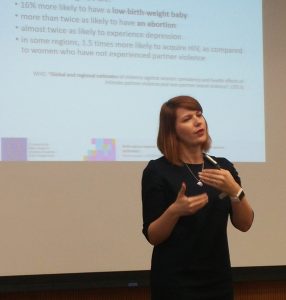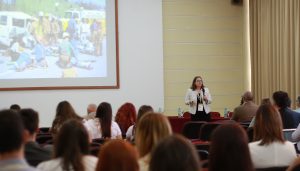When Romanian student Diana Dulf took the course Injury and Violence Prevention taught by UI IPRC’s Professor Corinne Peek-Asa, she became interested in the injury field and found her focus of research. That was 2009.

Fast forward: Dulf is now Assistant Professor at the Cluj School of Public Health at Babes-Bolyai University in Cluj-Napoca, Romania where she teaches and conducts research on topics like gender-based violence and childhood road safety. The School was established by UI IPRC’s Romanian partners led by Dr. Razvan Chereches.
In fact, much of the staff at Dulf’s young department, like her, were trainees at the UI in the National Institute of Health (NIH) Fogarty International training program, directed by Peek-Asa.
As a 2009 trainee, Dulf analyzed data on injuries in Romania in the European Injury Database and came again to the UI in 2013 during her PhD studies to focus on child safety restraint systems. Dulf received her PhD in 2015 from the Iuliu Hatieganu Medical and Pharmacy University in Romania.
“IPRC is one of the oldest partners our department has,” Dulf said. “The majority of our staff benefited from research training as part the Fogarty programs, and therefore, most of our public health training is a result of the UI College of Public Health Fogarty Programs.”
The Cluj School of Public Health was founded in 2010 and is the first public health program taught in English in Central and Eastern Europe. The school’s degree programs were developed in collaboration with UI CPH faculty, including Peek-Asa who attended the school’s formal launch.

“Collaborating with the faculty of the Cluj School of Public Health has been inspirational,” said Peek-Asa. “They have accomplished so much in a short time, and it has been a pleasure to be part of that.”
Since the Cluj School of Public Health’s opening, Dulf said, the UI IPRC and the School have continued to develop a strong research partnership, working on pilot projects of mutual interest, like geocoding of road traffic crashes, child safety and injury surveillance systems.
ICREATE (Injury Capacity in Research in Eastern Europe)
In 2016, the UI IPRC and Cluj School of Public Health received the NIH Fogarty grant ICREATE to help Dulf and her department transition from trainee to trainer and build injury research capacity at universities in three nearby countries: Moldova, Georgia and Armenia. All three countries are classified as Low- Middle Income Countries (LMIC), and are among the poorest in their region. They are also strategically located between Europe, Russia and the Middle East. ICREATE will focus on road traffic safety, violence against women and children, and acute care.

“It seemed like a good fit to build on our experience and start collaborating with other low-middle income countries that could benefit from training and capacity for research like we did,” Dulf said.
INITIATE (International Collaboration to Increase Traumatic Brain Injury Surveillance in Europe)
In 2017, the UI IPRC received another NIH Fogarty grant (INITIATE) to establish the first traumatic brain injury (TBI) registries in these three countries. These hospital-based registries will be used to document the burden and characteristics of TBI, and ultimately, aid prevention efforts and treatment.
TBIs disproportionately affect LMICs where patients are twice as likely to die from TBIs as high income countries. However, Dulf said, these three countries have no systematic data infrastructure to identify the burden of TBI or compare treatment protocols and outcomes.
“Of our partner countries, only Georgia has a non-fatal injury reporting system,” Dulf said. “In these countries, hospitals are not required to have electronic medical records and are not required to submit complete data to national ministries on traumas.”
Dulf said developing data infrastructures, like registries, and collaborative research networks are the first critical step in building improved treatment and research capacity in LMICs.
Internships and training opportunities in Romania
The UI IPRC’s longterm partnership with Romania has led to opportunities for UI CPH students conduct research, intern or take a course in Romania:
- The Cluj School of Public Health offers a student summer research program. Funding is available through MHIRT or CPH student travel awards.
- As part of ICREATE, in May 2018, UI CPH students participate in a week long course at the Cluj School of Public Health’s Global Injury and Violence Prevention Summer School. This course will include panels, presentations, workshops and visits with local agencies.
If interested in these opportunities, contact Sophie Switzer, Coordinator at the UI CPH Global Public Health Initiative: sophie-switzer@uiowa.edu
Published 1/2018